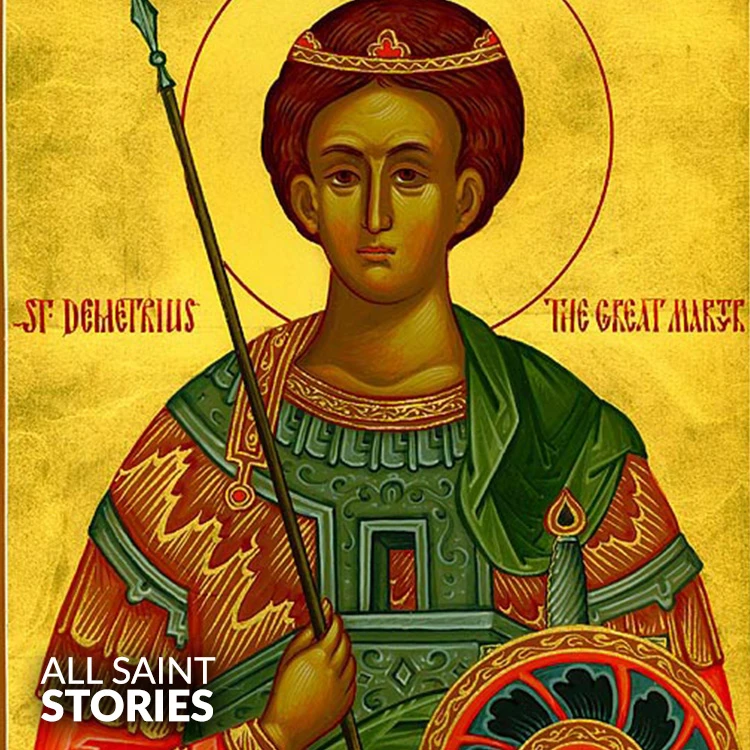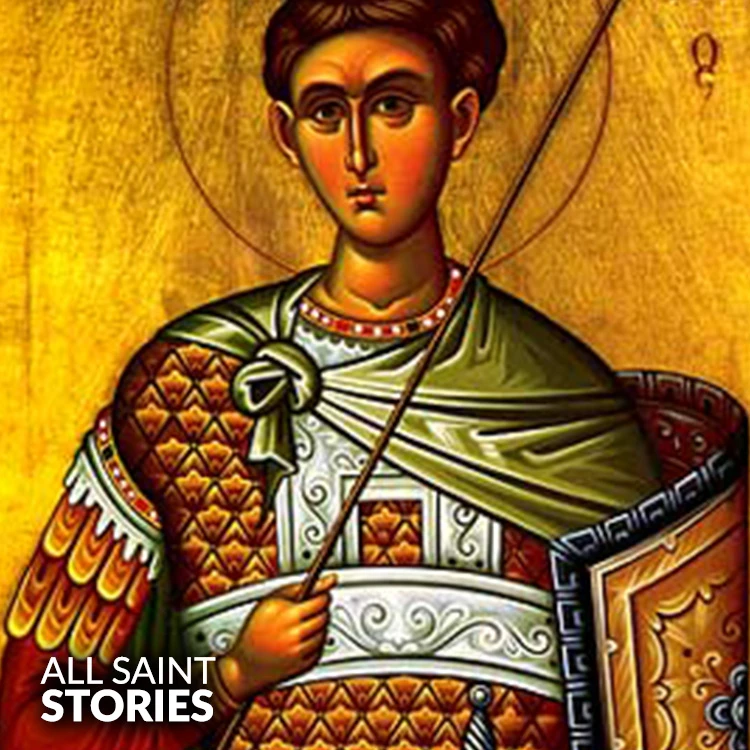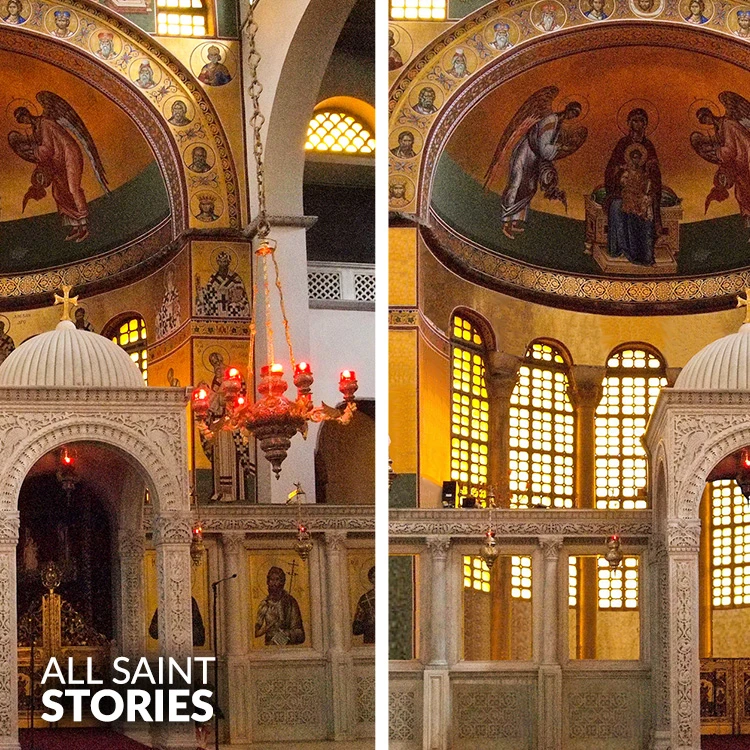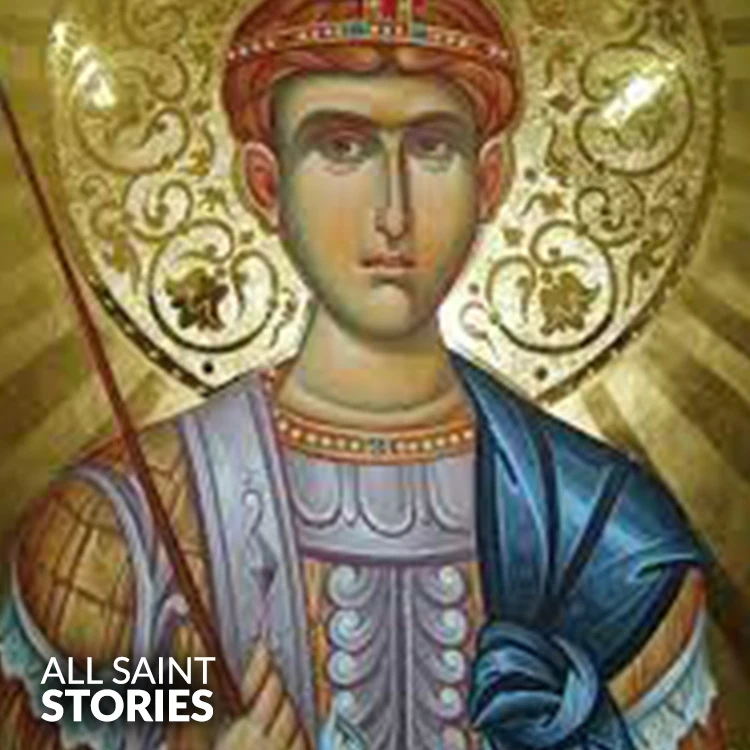St. Demetrius, Brave martyr and defender of the faith, Pray for us to stand firm in our beliefs. Help us to live with courage and devotion, And follow Christ’s example of love and sacrifice. Amen.
ST. DEMETRIUS OF THESSALONIKI
ST. DEMETRIUS OF THESSALONIKI

St. Demetrius of Thessaloniki was a 4th-century Christian martyr and soldier-saint renowned for his bravery, unwavering faith, and protection over the city of Thessaloniki. He is venerated in the Eastern Orthodox and Catholic Churches, known for miraculous interventions and as a myrrh-streaming saint.
St. Demetrius of Thessaloniki, also known as Dimitrios or Demetrios, was a Christian martyr of the early 4th century whose life and legacy have had a profound impact on Christian tradition, especially in the Eastern Orthodox Church. He was born around 270 AD in Thessaloniki, then a prominent city of the Roman Empire. While exact details of his early life are not definitively known, hagiographies and church traditions present him as a member of a noble family, possibly of senatorial rank. His family is believed to have been secretly Christian during a time of intense persecution under Roman emperors such as Diocletian and Galerius.
Demetrius rose to a high position in the Roman military, often described as a proconsul or commander stationed in Thessaloniki. Despite his official role, he remained a devout Christian and used his influence to spread the faith and encourage converts. This open defiance of imperial decrees forbidding Christianity eventually led to his arrest.
One of the most famous episodes in his hagiography involves the young Christian named Nestor, who sought Demetrius’s blessing before facing the feared pagan gladiator, Lyaeus, in the arena. Demetrius prayed for Nestor, who miraculously defeated the giant. In retaliation, Emperor Galerius ordered both men executed—Nestor by the sword and Demetrius by spearing in his prison cell, which some accounts place in a Roman bathhouse. This martyrdom is traditionally dated to October 26, 306 AD, and it became his feast day in Christian liturgical calendars.
After his death, the Christian community of Thessaloniki quickly began to venerate Demetrius as a martyr. His tomb became a pilgrimage site, and over time, a great church—the Basilica of Saint Demetrius—was constructed above the site of his imprisonment and death. This basilica, known as Hagios Demetrios, remains one of the most significant early Christian churches and houses relics associated with the saint.
St. Demetrius became widely revered not only as a martyr but as a protector of Thessaloniki. Numerous miraculous interventions are attributed to him, particularly during the 6th and 7th centuries when the city faced repeated sieges by barbarian tribes such as the Slavs and Avars. According to tradition, Demetrius appeared on the city walls or in dreams, inspiring defenders and repelling invaders. These miracles solidified his reputation as a guardian saint.
Another key aspect of his veneration is the phenomenon of "myroblyte" or "myrrh-streaming." It was reported that his relics exuded a fragrant, healing oil or myrrh, which drew pilgrims from all over the Christian world. This miraculous oil was believed to cure illness and bring spiritual blessings, further enhancing his cult following.
In iconography, St. Demetrius is typically depicted as a youthful soldier in Roman military attire, often mounted on a red horse or standing with a spear or sword. One of the most famous depictions shows him slaying Lyaeus, symbolizing his victory over paganism and evil. His imagery closely parallels that of St. George, another military martyr, though Demetrius is often considered the patron specifically of the Eastern Roman (Byzantine) military.
St. Demetrius is venerated not only in Greece but also throughout Eastern Europe, including Russia, Serbia, Bulgaria, and Ukraine. In Slavic traditions, "Demetrius Saturday," a day of remembrance for the departed, is observed near his feast day. His cult also had a significant influence on medieval military saints and Byzantine civic identity.
Although St. Demetrius was never canonized through the formal processes established in the later Catholic Church, his veneration began in the early centuries of Christianity, and he is considered a saint "pre-Congregation," meaning he was universally accepted by the faithful and recognized as a saint long before the formalized canonization process was introduced.
His enduring legacy as a defender of the faith, miracle-worker, and protector of cities keeps him among the most beloved and revered saints in Eastern Christianity.
Video Not Found
The information on this website is compiled from various trusted sources. While we aim for accuracy, some details may be incomplete or contain discrepancies.
If you notice any errors or have additional information about this saint, please use the form on the left to share your suggestions. Your input helps us improve and maintain reliable content for everyone.
All submissions are reviewed carefully, and your personal details will remain confidential. Thank you for contributing to the accuracy and value of this resource.
Credits & Acknowledgments
- Anudina Visudhar (Malayalam) – Life of Saints for Everyday
by Msgr. Thomas Moothedan, M.A., D.D. - Saint Companions for Each Day
by A. J. M. Mausolfe & J. K. Mausolfe - US Catholic (Faith in Real Life) – Informational articles
- Wikipedia – General reference content and images
- Anastpaul.com – Saint images and reflections
- Pravachaka Sabdam (Malayalam) – Saint-related content and insights
We sincerely thank these authors and platforms for their valuable contributions. If we have unintentionally missed any attribution, please notify us, and we will make the correction promptly.
If you have any suggestion about ST. DEMETRIUS OF THESSALONIKI
Your suggestion will help improve the information about this saint. Your details will not be disclosed anywhere.
© 2026 Copyright @ www.allsaintstories.com





 English
English
 Italian
Italian
 French
French
 Spanish
Spanish
 Malayalam
Malayalam
 Russian
Russian
 Korean
Korean
 Sinhala
Sinhala
 Japanese
Japanese
 Arabic
Arabic
 Portuguese
Portuguese
 Bantu
Bantu
 Greek
Greek
 German
German
 Dutch
Dutch
 Filipino
Filipino